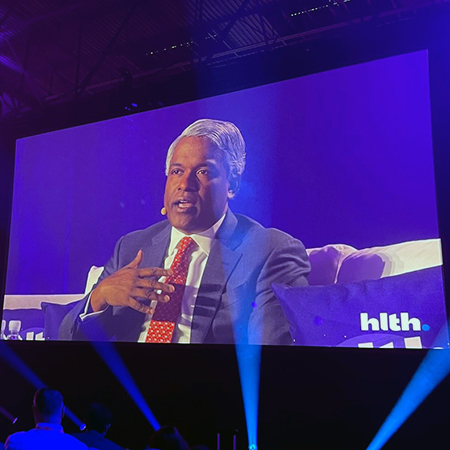HLTH 2022 Roundup: CEOs Of BD And Google Cloud On Innovation, Interoperability, AI
Executive Summary
In this second roundup of HLTH, which drew more than 9,000 attendees to Las Vegas from 13-16 November, Medtech Insight highlights presentations from the CEOs of BD and Google Cloud and insights from an interview with BD’s CEO Tom Polen.
Becton Dickinson AB CEO Tom Polen took the stage at HLTH to talk about BD’s role in redefining the future of health care.
He noted that the introduction of smart devices that allow for continuous patient monitoring has created a paradigm shift in health care with many benefits, but also challenges.
“Let’s monitor and let’s alert if something goes awry, has spread to every aspect of care,” Polen told the HTLH audience. “With smart technology, the clinician’s job began to change and monitoring became easier. But care was redirected through an increasingly chaotic cadence of alarms, and responding to each of these became the clinician’s growing focus.”
The result of these relentless alerts by devices that don’t communicate with each other has been “alarm fatigue” and physician burnout, Polen said.
Indeed, health care is facing “an epidemic of physician exhaustion.” Almost four in 10 hospitals face nursing shortages, one in six reporting a critical shortage , Polen said. He added that pharmacists are under similar strain.
“Next generation of devices need to be integrated and autonomous” - Tom Polen, CEO BD @HLTHEVENT #hlth2022 pic.twitter.com/tRkzcgVkEI
— Marion Webb (@medtechMarion) November 15, 2022
“Now at this point probably the last thing I should recommend is solving the technology overload problem with more technology,” Polen quipped. Instead, he suggested a “mindset shift” as the next generation of smart devices are integrated and empowered by AI and machine learning.
“There’s tremendous opportunity ahead,” he said.
In Polen’s view, next-gen devices will be able to manage a critically ill patient’s optimal body temperature based on physician recommendations or offer recommendations for medications based on gained insights.
“The second major thing we need to make sure is happening is streamlining alerts, information and insights by connecting disparate data sources,” Polen said.
Examples include auto-programming of infusion pumps and auto-reordering medications in the pharmacy. BD developed the Alaris system, which is an infusion pump and vital signs monitoring system, designed to deliver fluids, medications and blood in controlled amounts. The pump has been recalled by the FDA in June 2021 (Class 1 recall, the most serious type of recall) and is currently under review by the FDA. (Also see "Class I Recall For BD Intraosseous Infusion System" - Medtech Insight, 11 Aug, 2022.)
Polen told analysts during the 10 November fourth-quarter earnings call that the company continues to have “active discussions with the FDA on Alaris,” but didn’t want to predict timing of possible marketing clearance.
BD hopes to drive connected medication management pharmacy automation through its acquisition of pharmacy automation company Parata Systems, completed in July. The company partnered with private equity firm Frazier Healthcare Partners to buy Parata for $1.53bn. Mike Garrison, BD’s president-medical segment who led the acquisition of Parata, told analysts during the fourth-quarter earnings call that Parata “directly addresses the labor shortages and the clinical efficiencies that customers are seeking … as well as long-term goals around smart connected care, data-driven decision-making.”
“The third thing is the automation of tedious, repetitive tasks,” he said. He gave the example of the pharmacy where prescriptions are robotically filled using AI and shipped directly to the patient’s home without any human interaction.
“If we start insisting on these standards of technology … we are going to begin to raise the bar on how technology advances health, and how it not only reduces error, but reduces the stress of constantly guarding against it,” Polen said.
The CEO added, “We’re still in the very early stages of what’s possible, especially with AI and machine learning.
Polen, who took the helm of BD at the start of the pandemic, told Medtech Insight in an interview at HLTH that the company will be focusing on smart connected care – applying informatics, robotics, automation and AI to transform health care processes – as well as technologies that facilitate the shift to new health care settings, such as the patient’s home, and solutions that improve outcomes for patients living with chronic diseases. (Also see "Podcast: BD’s Polen Pursues ‘True North’ Path To High-Value Growth" - Medtech Insight, 6 Jul, 2022.)
Commenting on the outlook for medtech in the current economy, Polen said companies need to focus on creating value for their customers and organizations and being resilient over the coming years.
“We certainly have gone through that … We’re doing it not only in the organization on initiatives, but we’ve been doing it on our portfolio,” Polen said. He gave the example of the firm’s RECODE optimization initiative to achieve cost-savings by simplifying its portfolio and exit products that add complexity in their manufacturing plants.
“We’re assuming that inflation will continue – not at the 9% that it had before – but could be 6% or 7%, it’s near 8% now,” Polen noted. The CEO expects supply chain issues to continue, but said BD has always been strong in the way of “manufacturing, contingencies and robustness.”
Google Cloud
In a 14 November fireside chat, titled “Why Healthcare Needs Big Tech,” Thomas Kurian, CEO of Google Cloud, discussed new business models and how systems within health care, pharmaceuticals and research will fundamentally change.
The tech giant also made several announcements, including a partnership with Epic to build a product for customers to run Epic workloads on Google Cloud. Robert Garrett, CEO of Hackensack Meridian Health, said in a statement that running Epic on Google Cloud will allow the health system to “innovate faster and benefit from a more efficient and secure cloud environment.”
Hackensack Meridian Health and Lifepoint Health announced they will join Google Cloud to launch three new health care data engine accelerators in an effort to increase health data accessibility, ease-of-use and interoperability. Health care data is often siloed in legacy systems that do not communicate with each other, an impediment Google Cloud’s platform aims to address.
Kurian spoke to how Google Cloud ensures that patient data are kept safe and not misused by de-identifying, encrypting and protecting data with cybersecurity tools. He assured attendees, “We are a technology provider. We think of ourselves as being the bank and we don’t know what’s in the vault. The only person who knows what’s in the vault is the hospital that’s using our technology to serve patients better.”.
Google Cloud wasn’t the only tech giant to use HLTH’s platform for announcements.
Amazon announced on 15 November it is expanding its health care offering by opening virtual “Amazon Clinics.” Patients in 32 states will be able to message clinicians through a secure portal to seek personalized treatments and prescriptions for common conditions such as allergies, acne and hair loss. The service does not yet accept insurance, but Amazon Clinic customers can select any pharmacy, including Amazon Pharmacy, to fill prescriptions and can use their insurance to pay for medications, the company said.
The new program comes just months after Amazon said it would shut down Amazon Care, by year-end. Amazon Care was launched as a pilot telehealth service for employees to provide virtual urgent care and offered in-home visits from nurses for a fee for certain health care services.
Other HLTH News
Digital therapeutics company Hello Heart announced a new edition to its digital heart health program. Dot-to-Dot uses clinical research and AI to help people connect lifestyle choices to their heart health. Users see trends such as minutes walked daily and daily medication adherence and how it correlates to blood pressure. “Seeing the dots connected informs users with insights to build and reinforce lasting healthy habits,” the company said.
Continuous health care monitoring company BioIntelliSense Inc. announced a collaboration with the Translational Research Institute for Space Health (TRISH) on health research in outer space. The Polaris Dawn crew will use BiointelliSense’s BioButton, worn on the chest, to capture physiologic and movement data during the upcoming five-day Polaris Dawn mission. (Also see "Start-Up Spotlight: BioIntelliSense Launches New FDA-Cleared BioSticker For Remote Monitoring Of Patients' Vital Signs" - Medtech Insight, 10 Feb, 2020.)
Biointellisense brings its Biobutton into space to measure key vital signs during space missions through partnership with TRISH. #hlth2022 #medtech pic.twitter.com/TMD8owQnQL
— Marion Webb (@medtechMarion) November 14, 2022
CardioSignal said it is working closely with the FDA and plans to launch its first remote cardiac care solution in the US in the first quarter of 2023. The company entered a partnership with JISEKI Health, a marketplace that delivers net triage for service providers across a range of clinical, social and behavioral services, to introduce its virtual care model in heart health.
Cardiosignal introduces RMP and virtual care solution in US q1 at “low cost.” pic.twitter.com/D0mRA7rPiL
— Marion Webb (@medtechMarion) November 14, 2022

